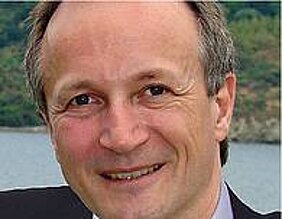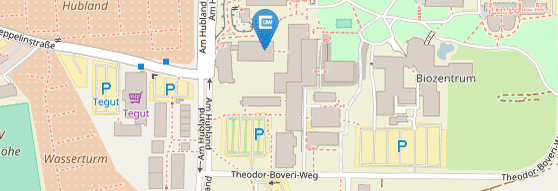Chemistry Professor Frank Würthner Highly Cited Worldwide
12/02/2016Frank Würthner is one of the four professors from the University of Würzburg that have been identified as "highly cited researchers". The US media corporation Thomas Reuters awards this title to researchers whose work receives exceptional attention worldwide and is highly cited by other scientists.
The updated list now comprises four scientists from Würzburg: Jörg Vogel, Ingolf Steffan-Dewenter and Frank Würthner, who were already listed last year, are now joined by Professor Rainer Hedrich. The research conducted by these four scientists during the years 2004 to 2014 was among the one percent of most frequently cited papers worldwide in their subject field, earning them the mark of exceptional impact.
The survey by Thomson Reuters has been adjusted by subject field, which means that the general citation habits of the individual subject fields are accounted for in the analysis, so it is not a mere evaluation of absolute citation figures.
According to Thomson Reuters, their survey "comprises some of the most influential scientific minds in the world". The list comprises a total of around 3,000 researchers. The citation frequency is considered a measure of the scientific quality of a paper. For this purpose, Thomson Reuters relied on extensive scientific databases.
Rainer Hedrich is considered one of the fathers of researching electric signal transmission of plants based on ion channels. The biophysicist has been the first researcher in the world to directly determine the functioning of plant ion channels in the Göttingen-based Max Planck Laboratory of Nobel Laureate Erwin Neher. Hedrich received numerous awards of international renown, including the ERC Advanced Grant of the European Union. This research award was established to enable excellent scientists to tackle also risky projects. In the ERC project titled "Carnivorom", Hedrich explores the molecular bases that allow carnivorous plants to feed on animals. He discovered among others that the Venus flytrap counts how often it is touched by its prey where the number of stimuli determines when the trap snaps shuts and trigger digestion and the consumption of animal proteins.
Jörg Vogel researches regulatory RNA molecules in bacterial pathogens such as Salmonella and in affected human cells. His team develops new methods based on high-throughput sequencing to detect RNA molecules in high resolution and to understand how they work. With this approach he also established the basis for applying CTRISPR/Cas for genome editing. Professor Vogel is a biochemist and the director of the Institute for Molecular Infection Biology (IMIB) at the Medical Faculty of the University of Würzburg and spokesman of the Research Center for Infectious Diseases (ZINF). He is an elected member of the European Molecular Biology Organization EMBO and of the National Academy of Sciences (Leopoldina). As the founding director, Vogel will manage the establishment of the Helmholtz Institute for RNA-based Infection Research (HIRI) at the University of Würzburg.
Ingolf Steffan-Dewenter is an animal ecologist, entomologist and beekeeper. He studies the impact of climate change, habitat fragmentation, changed land use and invasive species on insect biodiversity and their meaning for ecosystem functions in tropic and temperate habitats. His research contributes to understanding the mechanisms that determine the abundance, frequency and interactions between species. He conducted ground-breaking studies of agricultural systems on the pollination of crops, biological pest control and the preservation of biodiversity. Current research projects are funded by Deutsche Forschungsgemeinschaft within the scope of Collaborative Research Center 1047 "Insect timing", Collaborative Research Center 1246 "Kilimanjaro ecosystems under global change" and several EU funded joint projects.
Frank Würthner is one of the founders of supramolecular material science and develops supramolecular polymers and nano-materials based on functional dyes for organic electronics and photovoltaics applications. Following successful research on converting sunlight to electricity (photovoltaics), Würthner has also experimented with dye-based materials that are capable of producing fuels with the help of sunlight since 2012. For this purpose, he focuses on biomimetic concepts and develops synthetic nanoreactors in which dyes harvest solar energy similar to natural photosynthesis and subsequently use them for photocatalytic water splitting. He pursues this goal as a member of the Bavarian research network "Solar Technologies go Hybrid" funded by the Bavarian Ministry of Economic Affairs and Media, Energy and Technology with EUR 50 million between 2012 and 2016. Würthner heads the Würzburg Center for Nanosystems Chemistry whose newly built research premises were inaugurated on 7 October 2016. This year, he was appointed Fellow of the Royal Society of Chemistry and admitted to the National Academy of Sciences (Leopoldina).
To visit the homepage of "Thomson Reuters Highly Cited Researchers", go to: highlycited.com
Contact
Prof. Dr. Frank Würthner, Institute of Organic Chemistry, phone +49 931 31-85340, wuerthner@chemie.uni-wuerzburg.de
By: Marco Bosch



